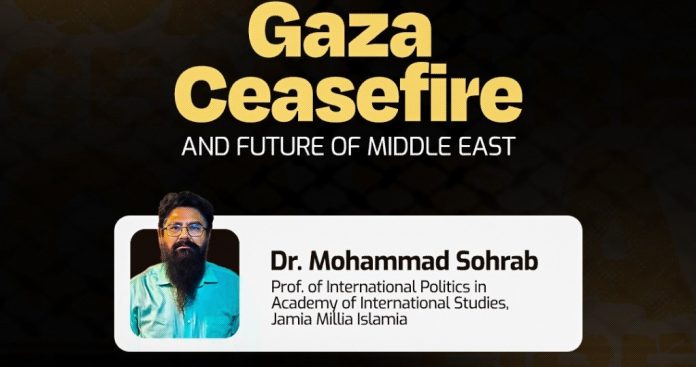New Delhi — In a program held at the Jamaat-e-Islami Hind headquarters, Professor Mohammad Sohrab, a renowned Middle East expert and Professor of International Politics at Jamia Millia Islamia, described the recent Gaza ceasefire deal as unstable and fragile, comparing it to the Oslo Accords. He emphasized that while the ceasefire has brought temporary relief, it does not address the underlying issues that have perpetuated the conflict. Prof. Sohrab praised Gaza’s resilience and unity, despite Israel’s ongoing efforts to fragment Palestine, including its controversial “De-Gaza” plan.
Prof. Sohrab noted that while the ceasefire was a step forward, the deal remains frail and lacks practical guarantees. Drawing a parallel to the Oslo Accords, which failed to deliver meaningful results for Palestine, he criticized the ceasefire’s lack of a reliable guarantor. He also pointed out that the same parties responsible for the conflict, Israel and the United States, are involved in the ceasefire negotiations, raising concerns over the deal’s sincerity.
The three-phase ceasefire involves a partial Israeli withdrawal and the release of some hostages in its first 42 days. However, details beyond the initial phase remain unclear, especially concerning the future governance of Gaza and Palestinian representation in subsequent negotiations. Prof. Sohrab questioned Israel’s real intentions, highlighting its ongoing strategy to reshape the geography and ecology of Gaza to make it uninhabitable, thus further isolating the region from the outside world.
Focusing on Israel’s broader strategy, Prof. Sohrab described its goal of controlling Gaza’s borders and establishing a permanent Israeli presence in the region. He cited a European Union think tank report on Israel’s “De-Gaza” plan, which aims to make Gaza uninhabitable, weakening Palestinian unity and pushing the dream of a Palestinian state further out of reach.
Speaking on Hamas’ role, Prof. Sohrab acknowledged the widespread support for the group in Gaza, citing the courage and resilience of the Palestinian people. Despite the brutality they face, Palestinians continue to rally behind Hamas, a reflection of their unity in the face of adversity. However, Prof. Sohrab also noted that both Western powers and many Arab nations oppose Hamas’ role in the political process, fearing that its model of governance could inspire political reforms in their own countries.
Shifting focus to U.S. foreign policy, Prof. Sohrab critiqued President Donald Trump’s contradictory stance on the Middle East. He pointed out that while Trump claimed that the Gaza conflict was “not our war,” his administration has consistently supported Israel with moral, diplomatic, and military backing. Prof. Sohrab highlighted several policy actions, including lifting restrictions on weapons sent to Israel and removing limits on U.S. citizens settling in the West Bank, that underscored the U.S.’s alignment with Israel.
Prof. Sohrab also discussed Saudi Arabia’s ambiguous position on normalizing relations with Israel. While the Kingdom has insisted that it will not endorse the Abraham Accords unless a Palestinian state is established, Prof. Sohrab predicts that Saudi Arabia will eventually compromise, influenced by domestic pressures and shifting geopolitical dynamics in the region.
Regarding broader Middle Eastern dynamics, Prof. Sohrab emphasized the role of non-Arab Muslim nations such as Turkey and Iran in the region, noting the reluctance of Arab states to include these countries in resolving the Palestinian issue. He lamented the Arab world’s failure to assert itself in negotiations, despite holding the strongest moral claim to support Palestine.
Despite the geopolitical challenges, Prof. Sohrab expressed hope for a new global consensus emerging in favor of Palestine, particularly from African nations and the West. He pointed out that the shift in awareness, especially in the West, is largely driven by grassroots movements. Prof. Sohrab also noted that 30% of Jewish Americans no longer identify with Zionism, reflecting a growing change in attitudes toward the Gaza conflict.
However, he warned that the Arab world’s weak stance continues to hinder Palestinian efforts on the international stage. He concluded by reiterating that the moral foundation of the Palestinian cause remains strong, despite the overwhelming power dynamics at play with Israel and the West.




